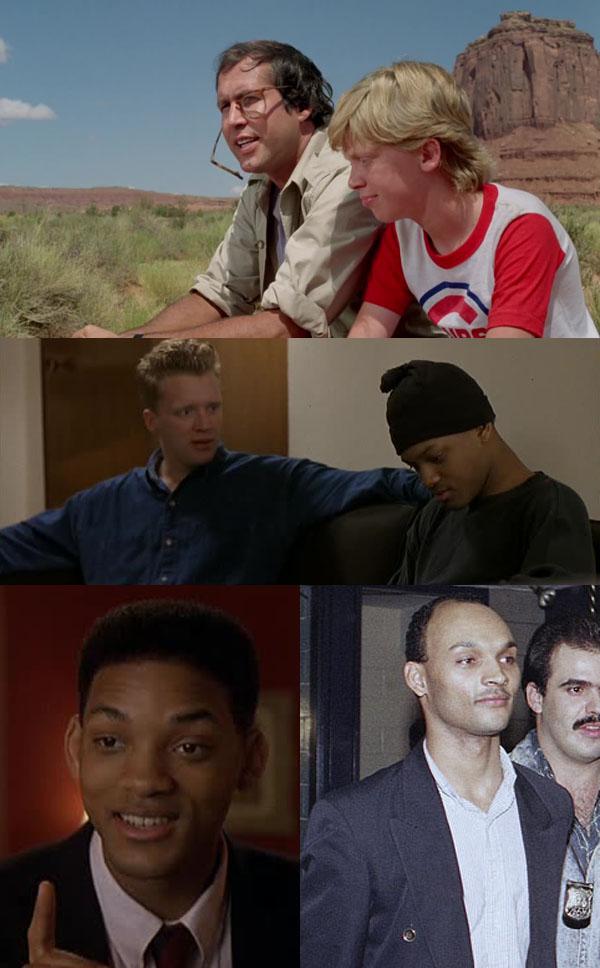Kenric L. Ashe
Film Review: Six Degrees of Separation (1993)
Posted Nov 30, 2014
Home Page
Posted Nov 30, 2014

Thanksgiving 2014, I was feeling lazy and in the mood for lighthearted easy-to-watch popcorn fluff, so I dug into some old John Hughes, starting with Planes, Trains, and Automobiles (which in the end I was reminded actually has a pretty deep message about the things that are important in life) and then National Lampoon's Vacation.
Maybe I just didn't remember but I'm pretty sure I'd never made the connection before that Rusty Griswold is played by the same actor -- Anthony Michael Hall -- who played Brian "The Brain" Johnson in The Breakfast Club. Then I started wondering how Anthony's career developed. Well it turns out I have seen him in other films and I didn't make the connection in those either: "The Geek" in Sixteen Candles, "Jim" in Edward Scissorhands, and "Engel" in The Dark Knight.
And then I discovered he's also in this 1993 film I'd never even heard of before: Six Degrees of Separation. No, it does not have Kevin Bacon in it. It is adapted from the Broadway play of the same name. The main star is Will Smith, and having just watched it I agree with the critics who say it's his most powerful performance ever. From the poster I wondered if it would be like Eddie Murphy's Trading Places, and maybe it is a tiny bit on the surface, especially from a marketing exec's perspective, but it is way deeper than that.
The other major roles are played expertly as well by Stockard Channing and Donald Sutherland, and then there are minor roles from other big names like Ian McKellen, Heather Graham, and even J.J. Abrams! There's not a bad apple in the bunch. Well, the college kids are snotty but that's the role they're supposed to be playing.
Around the 1:20:00 mark of the film there's a scene in which Will's character Paul says: "Always remember the wine from the even numbered years is superior to the wine from the odd numbered years." Skeptical of that claim, I paused to do some research. Turns out there's a small amount of truth to it if limited to specific region and decade, although it's still purely coincidental. (Some wine expert please correct me if I'm wrong.) But the far more interesting revelation of my side-track research was that Six Degrees of Separation is based on the real life story of David Hampton. This is surprisingly not mentioned anywhere in the reviews on Rotten Tomatoes nor IMDB.
From Wikipedia:
"Hampton was born in Buffalo, New York and was the eldest son of an attorney. He moved to New York City in 1981 and stumbled upon his now-famous ruse in 1983 when he and another man were attempting to gain entry into Studio 54. Unable to obtain entry, Hampton's partner decided to pose as Gregory Peck's son while Hampton assumed the identity of Sidney Poitier's son. They were ushered in as celebrities. Hampton began employing the persona of "David Poitier" to cadge free meals in restaurants. He also persuaded at least a dozen people into letting him stay with them and give him money, including Melanie Griffith, Gary Sinise, Calvin Klein, John Jay Iselin, the president of WNET, Osborn Elliott, the dean of the Columbia University Graduate School of Journalism, and a Manhattan urologist. He convinced some that he was an acquaintance of their children, some that he had just missed a plane to Los Angeles with his luggage still on it, and some that his belongings had been stolen.
Playwright John Guare became interested in Hampton's story through his friendship with two of his duped hosts — Osborn and Inger Elliott, who had been outraged to find 'David Poitier' in bed with another man the morning after they let him into their home. Six Degrees of Separation opened at the Lincoln Center in May 1990 and became a long-running success.
Hampton attempted to parlay the play's success to his benefit, giving interviews to the press, gate-crashing a producer's party, and beginning a campaign of harassment against Guare that included phone calls and death threats, prompting Guare to apply for a restraining order in April 1991, which was unsuccessful. In the fall of 1991, Hampton filed a $100 million lawsuit, claiming that the play had infringed on the copyright on his persona and his story. The lawsuit was eventually dismissed."
The budget for the film was estimated at $12 million and in the USA it grossed only $6.4 million, so obviously David asked for way too much. In fact, one could look at this as yet another loss for those who became involved with his series of cons. On the other hand, there may have been huge profits from the play. I don't know, but for the sake of discussion let's imagine that profits were made from his life. Would he have deserved a portion of that since he was the one who literally created the story? It seems highly debatable, and leads to a slippery slope. Do serial killers deserve royalties for all the millions of dollars that have been made from the dramatizations of their stories? Is their fame from that already crossing the line? It's a far more complicated debate when the criminal is so charming and most of his victims actually enjoyed his company and were even entertained by his presence, so at least they got something out of it and for the most part he wasn't so scary.
As is the nature of drama, the play and film probably both over-romanticize David Hampton. His not-so-charming criminal charges included (again according to Wikipedia) credit-card theft, threats of violence, burglary, and harassment. Sounds like he wasn't always such a pleasant fellow after all. On the other hand, it's equally likely that some of his charges were trumped up. He was acquitted on the harassment charge, for example.
For the sake of philosophy and returning to the original purpose of reviewing this film, let us now take it at face value and enter the realm of imagination, which by the way is one of its important themes.
Much of what the character in this story did was arguably not criminal. Posing as Sidney Poitier's son doesn't sound so bad when all he got from it was food and drink, a room for the night, and a tiny fraction of his victims' massive wealth. They offered it all willingly, and they received amazing conversation and companionship in return. He could have stolen the Kittredge's very valuable art possessions, but did not. Dr. Fine not only invited him into his house, but even gave him his keys. The doctor's son was perhaps somewhat justified when he called his father an idiot.
The film also contains some very important messages and a series of conundrums for everyone involved.
How does one succeed in the face of racism? If he had been born white, would he have felt the need to pretend, or would he have been accepted without question right away into the veritable country club?
How do you accumulate wealth and fame when you have neither? Of course there are more important values in life, but shouldn't every person have the same opportunities? Conversely, should every person -- including the "legitimately" wealthy and famous -- be despised for their varying degrees of fakery?
Pretending to be a celebrity seems not much different than being an actual celebrity, particularly when the latter comes from inherited wealth or an attractive body instead of talent, ingenuity, and hard work, with the latter quality -- effort -- being the most deserving of reward. The irony of this person's life was that he taught himself all the qualities to achieve social status, but he wasn't accepted because he was a Confidence Man. I love that phrase because it implies that being a con artist requires confidence. As Hunter said, "Stride confidently into their midst." It also requires con-vincing people, which is so much easier when they want to believe. Compared to many people in the upper echelons of society, was his fraud so very different? Maybe it's misguided, but I can't help having sympathy for him, especially after reading the NY Times article (see in the references below) which details how it all started relatively innocently and in a humorous way gaining entrance to Studio 54 and then getting VIP service at a restaurant because he was hungry and broke. If such fraud is illegal, aren't those who fall head over heels for the cult of personality at least accessories to the crime?
Six degrees of separation is the obvious main theme of this film, and it's ironic how that concept is exactly what I just experienced, from John Hughes to Anthony Michael Hall to this film with its screenwriter and playwright John Guare, and all the actors in it, and then to the real life David Hampton. We truly are all connected.
There are so many reasons why this is a very important film that I wish everyone would see and I'm amazed it took me 48 years to discover and experience myself. The fact that this is the first movie review I'm posting to my blog proves how much I liked it and how seminal I believe it is. It's also very timely at the moment as J.J. Abrams' post-holiday Star Wars trailer is all the rage and the death of Michael Brown in Ferguson has renewed racial tensions. Five thumbs up! See it today!
REFERENCES
http://wizardofvegas.com/forum/questions-and-answers/advice/12400-is-wine-better-in-even-or-odd-numbered-years/
http://www.nytimes.com/1990/06/21/theater/the-life-of-fakery-and-delusion-in-john-guare-s-six-degrees.html
http://www.nytimes.com/1990/07/31/theater/impersonator-wants-to-portray-still-others-this-time-onstage.html
http://www.nytimes.com/2003/07/19/nyregion/about-new-york-he-conned-the-society-crowd-but-died-alone.html
http://www.playbill.com/news/article/david-hampton-con-man-whose-exploits-inspired-six-degrees-dead-at-39-114376
Home Page
